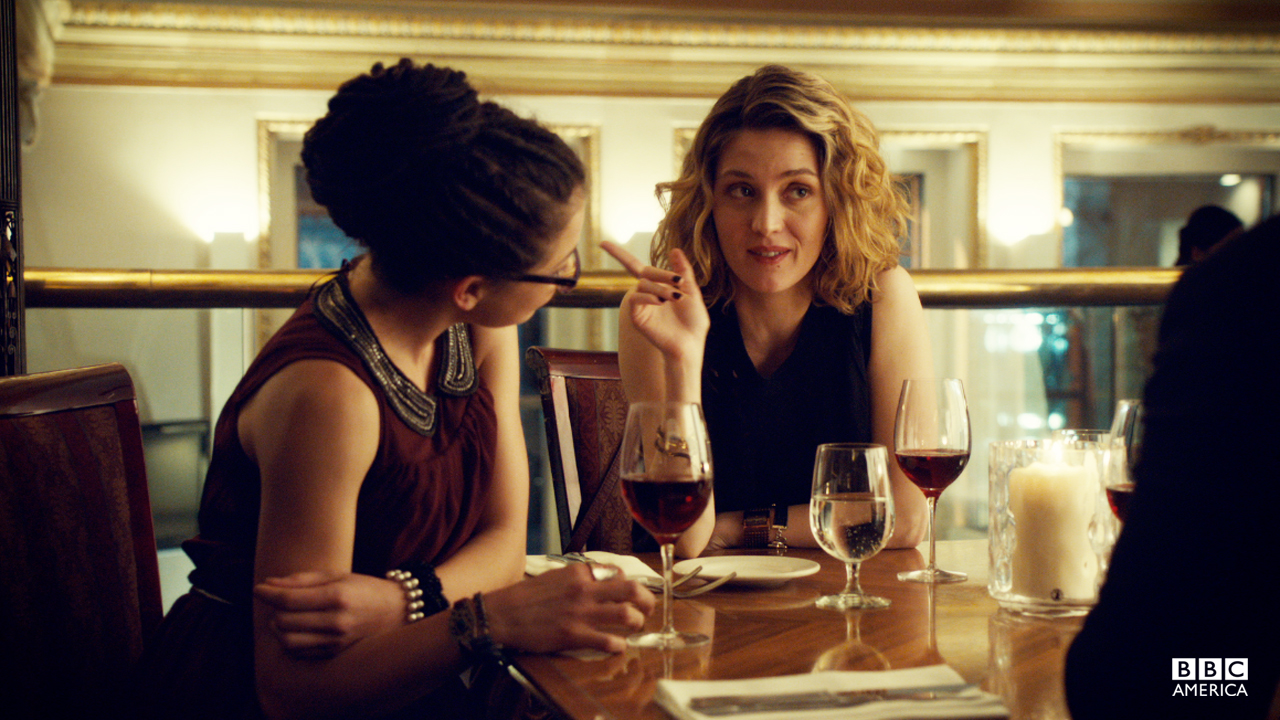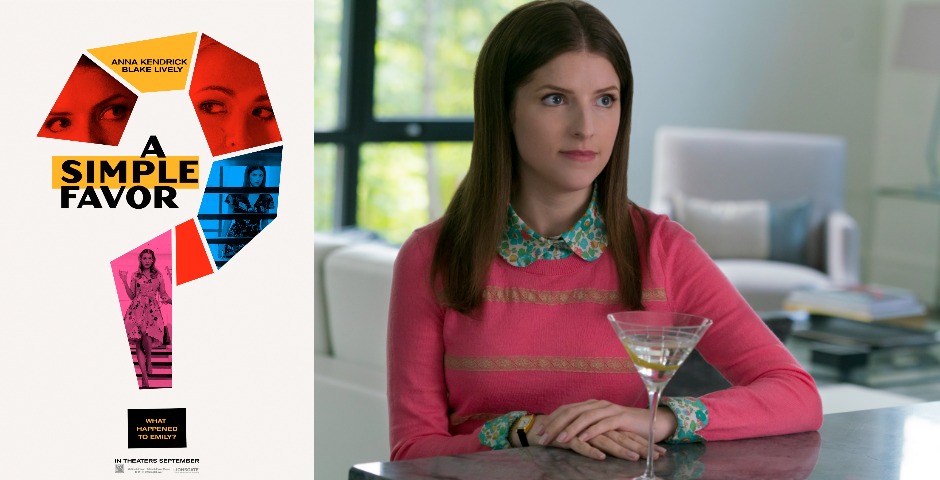Warning! This article contains spoilers for the first season of Orphan Black.
If you’re an avid reader of the site, a social media maven, or pop culture junkie, you’ve probably heard of Orphan Black by now: our own writer Christina wrote about it for our September On Our List feature; the show’s fandom, Clone Club, has taken Tumblr by storm; and Tatiana Maslany, the show’s star, has rocketed into the spotlight since the show’s March premiere, beating out Emmy award winner Claire Danes to take home the 2013 Critics’ Choice Television Award for Best Drama Actress.
If you’ve been inspired by any or all of these things to watch the show—or if you’ve been watching the whole time!—you’re aware that one of the elements at play in its core is the conflict of nature vs. nurture. It’s something that’s manipulated throughout Orphan Black’s 10-episode first season. With the clones alone, for example: Katja and Cosima are sick; Alison may be an alcoholic; Helena is homicidal, but Helena was raised by a church practitioner who, it’s implied, practiced mortification of the flesh; and Helena and Sarah, while both clones, are moreover twins, one given to the church and one to the state. In an age of genome mapping, when the increasing knowledge of our genes has led rise to a new sort of fatalism, who we are as dictated by our genetics is a growing fixation.
This fixation on where to attribute the origins of people’s traits is a discourse Orphan Black’s writers—some of the best in the business—have taken great care to integrate into the show. It affects the characters too, resulting in implications for all of Maslany’s seven-plus clones. One of them, Cosima Niehaus, identifies as bisexual, but rather than define Cosima’s storyline by her sexuality and the question it presents with regard to the other clones, Orphan Black describes sexuality’s place in the nature vs. nurture debate simply. “As a scientist,” says Delphine Cormier, Cosima’s love interest, “I know that sexuality is a spectrum. But, you know, social biases … codify attraction contrary to the biological facts.” This is all there is to be said on the matter.
Instead of her sexuality, Cosima’s storyline focuses in part on her relationship with Delphine. It’s a relationship in which the primary concern is not that it’s between two women, but that it’s complicated. Their relationship is oft celebrated amongst the show’s viewers, and in some ways rightfully so. A big part of last month’s LGBTQ Issue was the importance of visibility, and in a show like Orphan Black, whose name was so heavily circulated this past awards season, visibility for LGBTQ-identified women is fantastic.
It’s particularly encouraging because of both Cosima’s bisexuality—bisexual erasure, even in the LGBTQ community, is a huge issue—and Delphine’s willingness to acknowledge her fluidity despite having formerly identified as heterosexual. To see all that in a relationship between two women, especially one whose central conflict isn’t about being LGBTQ? For relatively mainstream media, that’s lightning in a bottle.
It’s easy, then, to understand why viewers are celebrating the Cosima-Delphine relationship. The visibility the show offers and the treatment it gives their relationship is something to be celebrated. Such a relationship’s continuance is something to be desired. However, while the visibility inherent in the Cosima-Delphine relationship is, in the media, something to aspire to, it doesn’t so follow that the actual relationship between the two characters is something to aspire to in one’s own relationship. It doesn’t absolve Delphine either, making her a perfect or even ideal partner. Cosima and Delphine’s relationship is perfectly aligned with Orphan Black’s narrative and greater thematic arcs, but it’s also one around which viewers have constructed their own mythos: that the Cosima-Delphine relationship is the healthy LGBTQ relationship we’ve all been waiting for.
Delphine is Cosima’s monitor. She’s meant to oversee Cosima as a clone and as property.
Even after Delphine rejoins Cosima in the season finale, Delphine is quick to recite “324b21,” or what is, essentially, Cosima’s serial code, as Cosima decodes her own DNA. Even if Delphine has fallen in love with Cosima—the jury’s still out, and will be until Orphan Black’s return—this moment serves as a reminder that whatever the state of their relationship now, it started out as something potentially far more sinister. It started out as Delphine watching over her boyfriend’s property, identifying Cosima not as a person and not by her name but as an object to be owned. What else are serial numbers for?
Monitoring Cosima is Delphine’s first and foremost responsibility. It’s why she meets Cosima, and it’s because of that responsibility that she first pursues Cosima and forges a friendship. We later see her attempt to apologize after Cosima discovers her identity as a colleague of Dr. Leekie’s, but at the core of all true apologies is action. By the season’s end, while we see Delphine presenting herself as Cosima’s ally and assisting in the decipherment of Cosima’s DNA, we never explicitly see Delphine’s departure from Leekie and the rest of the Neolutionists. We have no way of knowing whether or not Delphine’s apology was sincere, because everything we see between Delphine and Cosima post-fallout is what Delphine chooses to show Cosima.
Other monitors have made their allegiances explicit. We’ve seen Paul directly defy Neolutionists, and we’ve seen Donnie directly reporting to Leekie. In the case of Delphine, we’ve seen neither. We’ve simply seen her follow Cosima all the way to a different country after Cosima left after their confrontation, and proceed to help her uncover information about the clones that they would inevitably discover, given the implications of the Neolutionists’ contracts.
Could Delphine be well-intentioned? Certainly. Do she and Cosima have a healthy relationship? No. But neither do Paul and Sarah, nor do Alison and Donnie. The same stands for the show’s non-romantic relationships: Sarah and her daughter, Kira, hardly have a healthy relationship either. Visibility for healthy LGBTQ couples is crucial, but at this point in the show’s development, calling Cosima and Delphine’s relationship healthy is a disservice. So is saying a healthy relationship belongs on Orphan Black.
That the Cosima-Delphine relationship is dubious at best is typical of the show. None of its relationships are clear-cut, and no one individual’s nature is obvious. That Cosima and Delphine’s relationship is included in such ominous company instead of being hung up on the is-she-or-isn’t-she of it all is, for Orphan Black, that real thing we’ve been waiting for. So let’s sit back and enjoy the ride.
Hannah Pingleton is the resident LGBTQ Writer for Girls in Capes. You can find her on Twitter@hannahpings.






So spot on!! The tumblr fandom has gone crazy with Cosima and Delphine, but the foundation of their relationship is so sketchy that it’s hard to believe that there isn’t more where that came from in Delphine’s character. But you’re so right that all the relationships on the show are messed up, as relationships tend to be when clones are involved haha. Great article!
P.S. Briliant title.
Yes! Tumblr can be so fantastic for fandom in terms of discourse and connection, but in the time since OB has been airing I’ve seen a really alarming number of people talking about how healthy and positive a relationship Cosima and Delphine’s is.
Thank you so much!
I think this distinction also highlights how little action and danger Delphine and Cosima have faced. It makes sense that when Paul proved himself it was at imminent risk of life and limb, where as in Delphine’s case, her battle has been very much behind the scenes, so her rebellion is behind the scenes. It will be interesting to see if her and Cosima face danger from outside or within (Cosima’s sickness) next season.
Yes! I think this is a huge distinction, and one that’s fitting of the characters, given that Cosima is so behind the scenes and Sarah is very in your face. It follows that Delphine and Paul’s arc would so align.
I also feel that, because of the more behind-the-scenes nature of Cosima and Delphine’s involvement, there is more room for grey area. Physical altercations and even killing, as with Paul, are much more black and white, because of the severity of the action involved.
Their relationship might not be healthy, same as the others, as you correctly observed. But you seem to have overlooked that Delphine basically blew up Dyad’s plans to make them all sign the contracts. Doesn’t matter if they could’ve found out what their tag numbers mean sooner or later – by then they would’ve long had signed the contracts. And considering what Dyad’s revenge looked like when Sarah dared not to sign it, they had wanted them to sign the contracts really badly. Delphine, by helping Cosima, made it possible for the clones to keep defying Dyad instead of letting them take their (MAYBE temporary) sedative, so to speak.
And one of the creators even said that Delphine had followed her heart. (Manson, in this Vulture interview: http://www.vulture.com/2013/06/your-orphan-black-questions-answered.html)
“It started out as Delphine watching over her boyfriend’s property, identifying Cosima not as a person and not by her name but as an object to be owned.”
I didn’t have that impression. I think she at first might have had a bit of a split perception of Cosima: both as a research subject and a person. Which, obviously, isn’t exactly healthy either, but still… We also don’t even know the precise nature of her and Leekie’s relationship yet. Calling him her “boyfriend” is a bigger jump to conclusions than any Cophine-shipper has ever made. ;-)
I’m not entirely certain I understand what point you’re trying to make. The writer here is discussing a problem in the fandom, the glorification of Cosima and Delphine’s relationship: “Cosima and Delphine’s relationship is perfectly aligned with Orphan Black’s
narrative and greater thematic arcs, but it’s also one around which
viewers have constructed their own mythos: that the Cosima-Delphine
relationship is the healthy LGBTQ relationship we’ve all been waiting
for.”
As such, the point of the article is that it’s NOT the healthy LGBTQ relationship fans claim it is, and you agreed with that in the first sentence of your comment. Could you clarify what you’re trying to argue?
Not sure where the writer is getting her feedback from, but no fan of Orphan Black has ever claimed that relationship is healthy. If anything, the majority of us talk about how imperfect it is and discuss the shady elements of it. Some claim that both characters, as whole, are positive representation, which is something entirely different. That, in point, is what some are arguing here. No relationship on the show is healthy, most of the fanbase acknowledges that – there is no reason to nitpick, especially when you consider the writer’s misconception and misinterpretation of said character/relationship.
I’m writing to what I’ve seen on Tumblr and anon memes in other fandoms: several posts claiming Cosima and Delphine have “the first healthy queer relationship in media” and “an actual positive relationship,” each having hundreds of notes, most of which were in agreement. It’s something that stood out to myself and several of my peers as troubling, though when we spoke out about it, received a lot of backlash. When I asked them about it, my peers in other internet circles expressed the same experiences.
No one experience is the same, especially on Tumblr where no individual can see every discourse. Fandom is complicated and often fragmented, and as such I’m writing from my perspective and what I’ve encountered.
I’ve been tracking the Orphan Black and Cophine tags on Tumblr from day one and have come across those comments once, maybe twice. I’ve seen more people talking about how they only watch the show for Paul. I don’t know where you get the idea that “an alarming number of people” talk about how healthy it is that it would stand out as to make the headline of an article. If the majority of a fanbase are vehemently discussing a particular topic, you will eventually find those posts, regardless of how they are tagged or whether or not they are tagged. Some fans have been discussing this article in length for the past two days, for example (over 100 notes, last time I checked) and yet the vast majority also disagrees with it for basically the same reasons a few here have already covered.
So, those particular posts talking about how healthy the relationship is stood out for you and you wanted to write about it, great. But the mistake here is that you presumed that opinion is shared among “an alarming number of people” and it simply isn’t.
As I didn’t make the posts, I can’t say why or why not they wouldn’t have shown up in your tracked tags. Maybe their OPs didn’t tag. Maybe the Orphan Black or Cophine tags were after the first five. Reblogs also aren’t included in tags. There are plenty of reasons, but I have no idea of knowing why as I’m not the OP.
As far as my choice of the words “alarming number of people” goes, it’s something I stand by. I saw posts touting Cophine’s relationship as healthy, with notes in the triple digits, and that was alarming to me, because at that point in the series, it wasn’t. It’s something I would find alarming even if it was one person.
I have encountered the negative commentary, as well as a lot of incredibly positive commentary about it. I’m delighted to see dialogue either way, because it was a topic that, from the perspective I had, needed to be discussed.
So, “an alarming number of people” means one person to you? Because even if that particular post had over 3K notes, most people could still be disagreeing – such as the case with this article. A person can like a note and still not agree to it. Unless there is an ongoing discussion and they are mostly agreeing to the subject matter, then there is no way for you to measure it.
And considering “an alarming number of people” apparently did not pay attention to the finale – or follow-up from the show’s creators – and also presume Delphine is playing Cosima or [insert similar fallacy here] it is really no wonder there would be positive commentary about it. In any case, there is commentary about it, which can only be a positive thing in this long, long hiatus. I am kind of tired of seeing the same photosets reblogged over and over again.
The cases about which I’m speaking had notes in the triple digits, as I’ve said, and I remember browsing the reblogs to see a lot of people reblogging in agreement. I mentioned the “even if one person” caveat because yes, I personally would find it alarming even if one person found their relationship healthy right now.
I don’t presume that Delphine is playing Cosima. I also don’t presume that she isn’t. My intention was to point out that we can’t be sure either way, and because of that, no one–not even one person–should be declaring their relationship healthy or ideal.
Reblogs also don’t mean agreement, you do know that, right? People often reply in tags.
And yes, we CAN be sure. And no, that still does not make their relationship healthy or ideal [though what they feel for each other might be for some], but if a couple of people within a fandom of thousands presuming it is qualifies as an “alarming number” to you, then…
Talk about generalization. And that is what you did here because of something you would have pointed out even if *one* person had said it.
By “in agreement,” I meant the posts themselves–whether in terms of added text or tags–were indeed in agreement with the OP’s statement.
Again, in this particular instance, I am referring to more than 100 individuals as an “alarming number.” While even one individual viewing an unhealthy relationship as not only the status quo but also positive is alarming to me, had that been the case, I wouldn’t have used the words I did, or even written the piece I did. This particular instance is about way more than just a couple of people.
I’m not sure you’re following? It is still a generalization. Like I said, 100 (assuming 100 people were actually in agreement) in a fandom of a few thousands do not an alarming number make. So, yes, you ARE generalizing an entire fandom based on something a particular individual has said and a dozen others may or may not have agreed to. If we were talking about Paul and Sarah’s relationship? That would have been a more correct assessment, because their fandom is practically non-existent (and yes, that is still a generalization). Yes, it is an alarming number to you, and yes, I agree that it does sound ridiculous that over 100 people might see that relationship as healthy but that is still not how the majority of the fandom perceives them.
Hannah, if you’re looking for an “alarming number of people” gushing over unhealthy relationships, you might want to take a look at the Twilight fandom. Now THAT’s alarming. ;-)
If you’re looking for an “alarming number of people” gushing over unhealthy relationships, you might want to take a look at the Twilight fandom. Now THAT’s alarming. ;-)
“My intention was to point out that we can’t be sure either way,”
Apparently text comprehension isn’t your strong suit. Nor paying attention to what actually happened on the show and what the creators explicitly said.
I think you’re getting a little out of hand here devolving into personal attacks. go ahead and have all the feelings that you want about the content but don’t insult an individual’s intelligence or comprehension levels. It’s a low blow and entirely unnecessary. I suggest that you please Pay Attention to your language in the future: http://projectpayattn.tumblr.com/
Maybe they should pay attention to what’s actually happening on the show, then I wouldn’t have to pay attention to my language. Win-win.
Or you could just refrain from personal attacks in general…
Personal attacks and insults are not welcome on our site, as mentioned
in our rules (https://girlsincapes.com/the-team/team-rules/). There are
only three of them, and they don’t take long to read. While you’re
visiting our site, please make sure to follow those.
“Could you clarify what you’re trying to argue?”
The claims she made about Delphine’s allegiance, text-comprehension-champ.
The issue is more specifically about fan behavior and glorifying something unhealthy. Would you argue that the writer was incorrect that the relationship shouldn’t be glorified as a healthy queer relationship?
Also, personal attacks are not welcome on this site. If you can’t have a discussion without resorting to personal attacks, then this is not the right place for that discourse.
For clarification, my use of the term “boyfriend” with regards to Leekie stemmed from the evidence we’ve seen of his intimate, physical relationship with Delphine. Admittedly, that doesn’t so follow that the two were in a monogamous relationship, but there is evidence that the two were involved in some kind of relationship.
I don’t see what monogamy is supposed to have to do with this. %-)
Ultimately, we seem to be in agreement: neither of us think Cosima and Delphine’s relationship is heathy, neither of us think any relationship on the show is, and we both recognize that that fact is a huge part of the show.
That said, I didn’t highlight the points I did with the intention of saying Delphine doesn’t have feelings for Cosima, or that Delphine isn’t going to work towards making her healthier. I absolutely believe that could happen, and would very much like to see it. I’m simply saying, at this point, that because of the relationship’s foundations and Delphine’s past associations, we can’t declare her relationship with Cosima a healthy or even necessary a positive one at this point in the series’ progress. While the show’s creators have indicated Delphine’s feelings to us, they’ve also made choices that leave her in a grey area. Can that change later? Absolutely, but it hasn’t yet.
For clarification, my intention in discussing making “allegiances explicit” was to say that the other two monitors we know about–Paul and Donnie–have acted in either accordance or discordance with the Neolutionists to their faces. We see Donnie directly reporting to Leekie, while we see Paul fighting Neolutionists. They’re in person, tête-à-tête actions that we haven’t seen of Delphine yet. I’m by no means saying that if we did, she’d be positively aligned with the Neolutionists; I’m only saying that we don’t know whether she would or wouldn’t be, and that’s something we need to be cognizant of. I’m also not comparing the caliber of Delphine’s to Paul’s or Donnie’s.